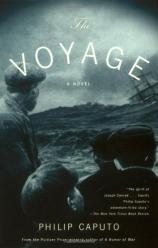Reading Group Guide
Discussion Questions
The Voyage

1. Is there a hero (or are there heroes) of The Voyage? What is the concept of hero in the novel? If not heroes, are the boys brave? Who is the bravest? What is bravery?
2. The "voyage" of the title could symbolize many things--the literal sailing trip, the journey from boyhood to manhood, and Sybil's journey of discovery. How do you interpret it? Does the concept of "voyage" take on different meanings throughout the novel? How does the author blend the different meanings of "voyage?"
3. How are the American North and South portrayed in the novel? How does Havana compare to the United States? How does the geographical journey of the Double Eagle allegorically retrace in reverse the history of the United States?
4. The Voyage is narrated by an old friend of Sybil's (who makes her debut on p. 20), and the story itself is "imagined" by Sybil as she reconstructs the past. Is this double layer of narration effective as a literary device? Does the narrator's presence detract from or promote the retelling of the story? The narrator explains, "Sybil has had to fill in the vast empty spaces in the chronicle by making things up . . . " [p. 20]. Does knowing Sybil "imagined" the story detract from the believability and realism of the tale? How, if at all, is the reader affected by learning in the epilogue that the narrator is a female college roommate of Sybil's? How do Sybil's personal circumstances and her relationship with her family color her "retelling" of her ancestors' story?
5. How does the epigraph attributed to Joseph Conrad foreshadow the events on the sea? Is the sea a friend or foe to Nathaniel and his brothers? To Cyrus?
6. What is the significance of the names the author selected for the boys' vessel, Double Eagle, and that of Cyrus, Main Chance?
7. What did Cyrus mean when he said "It's a new century, boys. Yes, indeed, a brand-new century" [p. 19]? Or, what did Sybil mean when she "imagined" Cyrus saying this? The "new century" motif appears four more times in the novel in different contexts (p. 170, 191, 232, and 273). How does this motif weave the themes of the book together? How is the twentieht century contrasted with the nineteenth century in the novel?
8. As Sybil describes it, "[T]he Braithwaites were more a tribe than a family, and more than a tribe, a consanguineous commonwealth of patriarchs, and matriarchs, aunts, uncles, first, second, and third cousins" [p. 22]. The concept of family takes on almost mythic proportions in the beginning of the novel--how are these myths simultaneously shattered and upheld along Sybil's path to discovery? How is this image of a family and the subsequent deconstruction of this image a metaphor for the deconstruction of American history?
9. Compare and contrast the personalities of Eliot, Drew, and Nat. What are their likes and dislikes? How does the author portray each of the brothers' characters via their relationships with each other? With Will? With the sea?
10. Prior to their trip, Nat "could not conceive of anything bad happening to him, simply because nothing ever had" [p. 143]. Later, Nat is filled with "self-loathing" as he is overwhelmed by his multitude of failures on the voyage [p. 321]. What "bad" things happen to Nat on the voyage? How is The Voyage a coming-of-age story for Nat? For the other boys? Does that necessitate a loss of innocence? Does it result in a loss or gain of confidence for each of the boys? What are the lessons learned by the boys, if any?
11. What is the significance of the subplot involving the wreck of the Annisquam to Sybil's family history? To the explanation of Cyrus's behavior towards his family?
12. Nat uses a nearly biblical metaphor recalling the creation story to describe the creation of a sailing vessel as "more even than art. . . . It was as if the men who designed and built her somehow endowed her with aspects of themselves, their various traits seeping with their sweat into her ribs and knees and bowels . . . " [p. 54]. The boys view Southern Cross at the site of the Annisquam. [p. 273] Cyrus quotes the Bible in his cryptic telegram to Havana [p. 375]. How do the religious and biblical overtones build a sense of moral inevitability in the novel's conclusion, i.e. "the sins of the fathers. . . ."? At the same time, along their journey, the boys incant seafaring superstition, and Caputo peppers The Voyage with sea shanties. Does superstition undermine the religious tenets of the novel? Upon which, religion or superstition, do the boys rely more? Are religion and superstition compatible on the sea? In the novel?
13. How would you describe the mood of the novel? Does it change from land to sea?
14. In the character of Gertrude Williams the reader gets a glimpse of the women's emancipation movement brewing at the turn of the nineteenth century. How are the situations of other female characters (the boys' mother, Aunt Judith, Elvira) symbolic of women's emancipation and the theme of emancipation in American history in general?
15. After weathering the lengthy battle with the sea along with the boys, how is the reader affected by the contrasting subplot of Will's illicit romance with Elvira [Chapter 24]? How does this subplot serve as a microcosm of the mysterious history of the Braithwaite family?
The Voyage
- Publication Date: November 14, 2000
- Paperback: 415 pages
- Publisher: Vintage
- ISBN-10: 0679768394
- ISBN-13: 9780679768395








